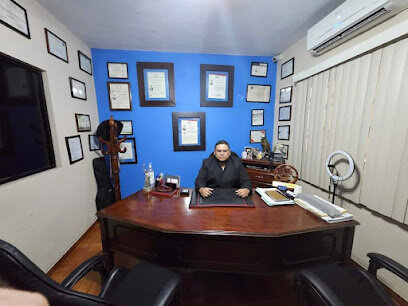Best Transportation Lawyers in Tampico
Share your needs with us, get contacted by law firms.
Free. Takes 2 min.
List of the best lawyers in Tampico, Mexico
About Transportation Law in Tampico, Mexico
Tampico, a bustling port city in the northeastern state of Tamaulipas, is a vital hub for transportation in Mexico. The city's transportation infrastructure includes a complex network of roads, seaports, and an airport that facilitates cargo and passenger movement. Transportation law in Tampico governs the movement of goods and people, ensuring safety, efficiency, and legal compliance in activities ranging from commercial shipping and logistics to public and private passenger transport.
Why You May Need a Lawyer
There are numerous scenarios where individuals or businesses might require legal assistance in the field of transportation in Tampico:
- Commercial Disputes: Disagreements over shipping contracts or logistics services.
- Personal Injury: Accidents involving public or private transport and related liability claims.
- Regulatory Compliance: Navigating local, state, and federal transportation regulations.
- Customs and Trade: Legal issues related to import/export procedures and tariffs.
- Insurance Claims: Disputes over coverage for transportation-related incidents.
- Environmental Regulations: Ensuring compliance with environmental laws related to transportation.
Local Laws Overview
Tampico's transportation laws are influenced by both federal and state regulations. Key aspects include:
- Road Safety Laws: Regulations and guidelines for road usage, vehicle standards, and driver qualifications.
- Maritime Law: Governing activities at the Port of Tampico, these laws include safety, logistics, and cargo handling regulations.
- Air Transportation Law: Federal regulations that oversee the operations of the General Francisco Javier Mina International Airport.
- Environmental Regulations: Laws aimed at minimizing the environmental impact of transportation activities.
- Customs and Trade Regulations: Federal laws that control the import and export of goods through Tampico's port and other entry points.
Frequently Asked Questions
1. What types of transportation activities are regulated in Tampico?
All types of transportation activities, including road, maritime, and air transport, are regulated to ensure safety, compliance, and efficiency.
2. Are there specific licenses required for commercial transport operators in Tampico?
Yes, commercial transport operators must obtain relevant licenses and permits, which vary based on the type of transport and goods or passengers being moved.
3. How can I address a dispute with a shipping company?
It's advisable to seek legal counsel for any commercial dispute. A lawyer specializing in transportation law can help mediate, negotiate, or litigate the matter.
4. What should I do if I’m involved in a transport-related accident?
First, ensure safety and seek medical attention if necessary. Then, report the incident to authorities and consult with a lawyer to understand your legal options.
5. What are the environmental responsibilities of transport companies in Tampico?
Transport companies must comply with environmental regulations that aim to minimize pollution and environmental impact, which may include proper waste disposal and emissions controls.
6. How do customs regulations affect transportation in Tampico?
Customs regulations impact the import and export of goods, requiring proper documentation, duties, and adherence to tariffs. Legal advice can help navigate these complex rules.
7. Can I handle a transportation-related legal matter without a lawyer?
While some minor issues might be resolved independently, most transportation-related legal matters are complex and best handled with professional legal assistance.
8. What are the consequences of violating transportation laws in Tampico?
Consequences can range from fines and penalties to more severe sanctions like license suspension or criminal charges, depending on the violation's nature and severity.
9. Who enforces transportation laws in Tampico?
Transportation laws are enforced by various local, state, and federal authorities, including the Secretaria de Comunicaciones y Transportes (SCT) and customs officials.
10. How do I choose the right lawyer for transportation legal issues?
Look for a lawyer with specific experience in transportation law, a good track record, and preferably someone familiar with local regulations and practices in Tampico.
Additional Resources
Here are some resources and organizations that could be beneficial:
- Secretaria de Comunicaciones y Transportes (SCT)
- Port Authority of Tampico
- General Francisco Javier Mina International Airport
- Local law firms specializing in transportation law
- Environmental Compliance units within maritime and transportation agencies
Next Steps
If you require legal assistance in transportation matters, consider the following steps:
- Identify the specific issue you’re facing and gather any relevant documents and information.
- Research and reach out to local attorneys specializing in transportation law.
- Schedule consultations to discuss your case and understand potential legal strategies.
- Follow your attorney’s advice and keep open communication to ensure the best possible outcome for your case.
Understanding transportation law in Tampico can be complex, but with the right legal support, you can effectively navigate any challenges you encounter.
Lawzana helps you find the best lawyers and law firms in Tampico through a curated and pre-screened list of qualified legal professionals. Our platform offers rankings and detailed profiles of attorneys and law firms, allowing you to compare based on practice areas, including Transportation, experience, and client feedback.
Each profile includes a description of the firm's areas of practice, client reviews, team members and partners, year of establishment, spoken languages, office locations, contact information, social media presence, and any published articles or resources. Most firms on our platform speak English and are experienced in both local and international legal matters.
Get a quote from top-rated law firms in Tampico, Mexico — quickly, securely, and without unnecessary hassle.
Disclaimer:
The information provided on this page is for general informational purposes only and does not constitute legal advice. While we strive to ensure the accuracy and relevance of the content, legal information may change over time, and interpretations of the law can vary. You should always consult with a qualified legal professional for advice specific to your situation.
We disclaim all liability for actions taken or not taken based on the content of this page. If you believe any information is incorrect or outdated, please contact us, and we will review and update it where appropriate.








